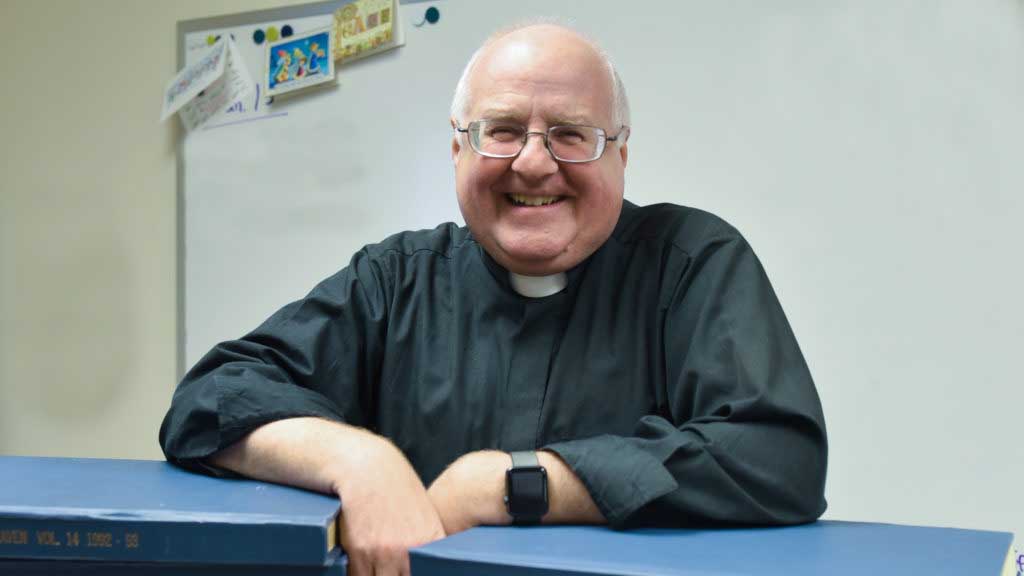
by Father Mark Goldasich
All means all.
I’ll never be able to .hear those words without thinking of a particular person. He was a fierce advocate for a worthy cause, but never pushy. He was a wonderful teacher and never demeaning. He was a dedicated, hard worker, but always with a gentle smile.
His welcoming personality underscored his vision for the church: that all means all. In other words, he walked the walk and didn’t just talk the talk.
The person I’m referring to is Tom Racunas, who retired last week as director of the archdiocesan special-needs ministry. It’s fitting that we have a story in this week’s Leaven on page 5 that features his famous words: All means all.
One enduring lesson that he taught me is the importance of the words we use, especially when speaking of one another. For example, I can no longer hear, without cringing a bit, that Gospel passage from Luke (17:11-19) often read on Thanksgiving Day. You’re familiar with this story of the ten lepers who come to Jesus asking that he have pity on them. Thanks to Tom, I now say in my mind: not lepers, but persons with leprosy. These people are much more than simply their disease.
Sometimes, people dismiss this sensitivity to words as just another instance of being “politically correct.” Far from being “PC,” Tom taught me that it’s actually a matter of courteous respect for one another.
In a column years ago, Tom spoke about how making venues physically accessible for people with special needs, like curb cuts and ramps, really benefits everyone. I thought about that — with a silent prayer of thanksgiving — every time I took my mom out when she was in a wheelchair.
And I recalled it again when bringing supplies into The Leaven office as I wheeled them on a dolly up the ramp to the back door of the church offices. How true that we all benefit from those accommodations for accessibility.
Honestly, though, I found Tom’s insights challenging. He made me conscious of how accessible — both physically and spiritually — my parish is. But even more so, I had to face how accessible my mind and heart are.
Tom was a living example of something I read last year in “Jesus Wears Socks with Sandals,” by S. James Meyer. In an entry called “The Challenge to Step Up,” Meyer highlights the observations of Ken Wilber, a psychologist and philosopher.
Wilbur noticed a “pattern of four foundational stages common to all: egocentrism, ethnocentrism, pluralism and universalism.” Meyer “dumbs it down” for the rest of us as follows:
Stage One: Life is about what’s best for me.
Stage Two: Life is about what’s best for my tribe — us vs. them.
Stage Three: Life is about what’s best for all tribes — us with them.
Stage Four: Life is about what’s best for us — we are all one; there is no them.
Tom has done great work in reminding us to strive for Stage Four, by being, for example, a welcoming community as we celebrate the sacraments: from the tiniest babies to the oldest parishioners, from those with fewer needs to those with special needs.
He’s made it clear that people with special needs are, first and foremost, people — people who also enjoy time at Prairie Star Ranch in Willamsburg and at summer Totus Tuus programs.
Beyond that, Tom hasn’t forgotten parents who care for people with special needs, from the monthly BREATHE respite program to the practical financial workshops on how aging parents can ensure care for their loved ones with special needs.
Tom, I wish you well in “retirement,” but know that you’ll always be a voice for people so easily forgotten or ignored. And don’t give up on me: I’m still at Stage Three . . . but improving, thanks to you!


How good of you, Father Mark, to have written this well-deserved piece about Tom. I’m certain that it won’t surprise you to know that Tom is also a sterling husband and father, and a witty, available, thoughtful, and reciprocal brother—even if he is 13 years younger than me. He is an all-around fine man.
Best Regards, Father Mark.